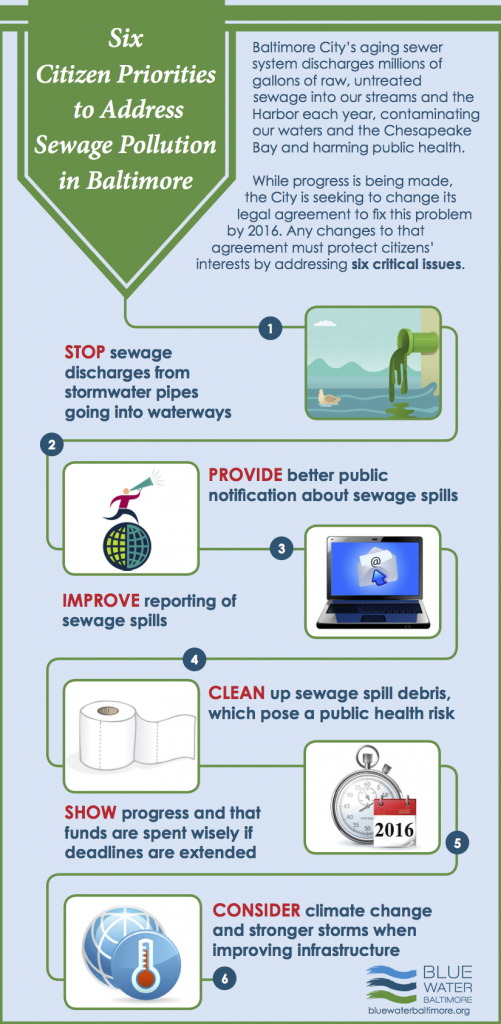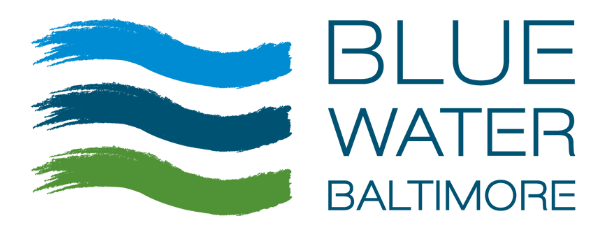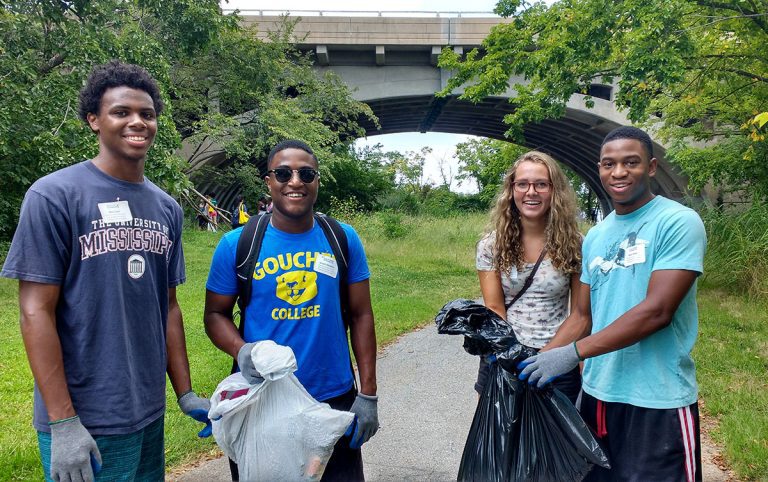Blue Water Baltimore Intervention in EPA Agreement Ruled “Untimely”
Blue Water Baltimore Executive Director Halle Van der Gaag today released the following statement in response to a U.S. District Court recent ruling denying the organization’s citizen intervention in a 2002 consent decree between Baltimore City, the Environmental Protection Agency (EPA), and Maryland Department of the Environment (MDE) requiring the City to fix the sewer system and prevent illegal sewage discharges by 2016:
We are disappointed in the Court’s decision. It is unfortunate that citizens and tax payers who are paying to fix our failing sewers will continue to be denied a seat at the table. Blue Water Baltimore’s attorneys presented several precedent-setting examples of case law where, under similar circumstances, intervention was allowed.
However, we are pleased that the court, as well as Baltimore City, EPA and MDE, have recognized our intervention may be appropriate when and if Baltimore City files for an extension of the 2002 consent decree.
Our mission is to be an advocate for water quality, and we are proud to have been able to take this important step to strongly push for clean water and accountability.
During this process, Blue Water Baltimore has elevated key problems with the consent decree and offered solutions. Regardless of the Court’s decision, we hope that the City will increase activities needed to address these issues, including better notification about contaminated waterways, faster clean up of wastewater debris to better protect public health, and stopping raw sewage from discharging via the stormdrain system.
We also believe better reporting and accountability is essential for public confidence in their government. Independent labs and Baltimore City’s own data show the streams and Harbor are highly contaminated with sewage, and increased corrective action from the City and oversight by regulators is still very much needed.
Although at this stage citizen intervention was denied, and allegations of violations of the consent decree were not addressed by the court, Blue Water Baltimore will continue to monitor ongoing consent decree violations and continue its multi-year effort to advocate with all parties for appropriate enforcement and compliance.
The City’s failing sewer system is more than 100 years old and is badly in need of repair, and Blue Water Baltimore continues to recognize the challenges of overhauling a very complex infrastructure system.
Ultimately, we believe amplifying the voice of citizens and the continued expertise that BWB brings to in this process will make the City’s agreement to finally fix its failing sewers more effective and do a better job of protecting Baltimore waters and the public health.
 In August, Blue Water Baltimore asked a federal judge to allow it to intervene in a 2002 lawsuit that was resolved by a settlement agreement between Baltimore City and state and federal authorities intended to fix the city’s failing sewer system by 2016. With recent media reports that the City is attempting to renegotiate its 2016 deadline, Blue Water Baltimore was seeking to intervene in the case to give citizens a voice in the revision process and to formally request that all parties do more to stop sewer spills and protect public safety.
In August, Blue Water Baltimore asked a federal judge to allow it to intervene in a 2002 lawsuit that was resolved by a settlement agreement between Baltimore City and state and federal authorities intended to fix the city’s failing sewer system by 2016. With recent media reports that the City is attempting to renegotiate its 2016 deadline, Blue Water Baltimore was seeking to intervene in the case to give citizens a voice in the revision process and to formally request that all parties do more to stop sewer spills and protect public safety.
Between 2010 and 2012, Baltimore City reported discharging more than 7 million gallons of raw sewage into Baltimore’s streams and Harbor. Blue Water Baltimore has found that MDE and EPA have chronically failed to enforce the consent decree and identified six critical issues that must be addressed through any consent decree revisions.
These include:
- Stopping sewage discharges from stormwater pipes going into waterways;
- Providing better public notification about sewage spills to help citizens assess risk of water
- contact;
- Improving reporting of sewage spills;
- Cleaning up sewage spill debris, which pose a public health risk;
- If deadlines are extended, demonstrating progress and that funds are spent wisely; and
- Considering the increased strength and frequency of storms due to climate change when
- improving infrastructure.
For more information, read a Fact Sheet about the 2002 consent decree here and view the Six Citizen Priorities to Address Sewage Pollution in Baltimore here.
FOR IMMEDIATE RELEASE
Contact:
- Dawn Stoltzfus, The Hatcher Group, 410-990-0284, (cell) 410-562-565
- Halle Van der Gaag, Executive Director (410) 254-1577 x105, 410-804-0520
- David Flores, Baltimore Harbor Waterkeeper (410) 254-1577 x108, (cell) 443-908-0696

